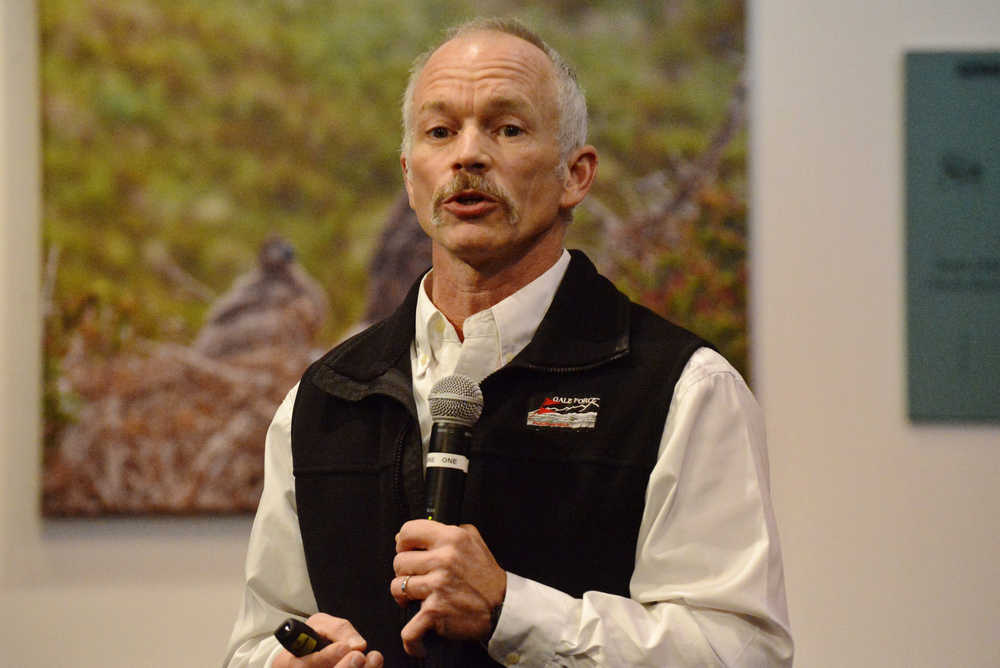Homer Electric Association’s General Manager Brad Janorschke made his case for deregulating the utility cooperative — the sole supplier of electricity to about 22,892 members on the Kenai Peninsula — during a presentation to the Kenai Chamber of Commerce on Wednesday.
HEA’s pricing is presently overseen by the Regulatory Commission of Alaska (RCA), the state agency monitoring utilities which often have natural monopolies — that is, provide services such as electricity for which it doesn’t make economic sense to have more than one provider in a given area because of high fixed costs — with the aim of protecting users from financial abuse. Alaska statute allows utility cooperatives to deregulate by a majority vote of their members. HEA officials advocating for withdrawal from RCA oversight describe the action as “local control” rather than “deregulation.”
HEA is controlled by an elected nine-member board of directors. Janorschke said if HEA were deregulated, this group would be analogous to a city council, “where the decisions they make impact the citizens, or the voters.”
“If the citizens of the city or the voters don’t like it, during that process they can participate in any of the meetings, they can write letters to the councilmen, and at some point if they don’t like it, they just vote them out,” Janorschke said.
Janorschke said deregulation would not change how HEA manages its current $353 million in debt, or how it repays members for its earning in excess of expenses, known as capital credits.
Because HEA is a cooperative, its earnings beyond expenses — what would become profit in a non-member-owned enterprise — are paid back to members according to the amount of electricity they’ve consumed. These capital credit payments are often deferred — most recently, Janorschke said, to maintain HEA’s finances while building new power plants.
“We’ve put a four-year moratorium on returning capital credits just to keep our balance sheet strong while we built our new generation facilities,” Janorschke said. “This is the last year. Assuming everything goes normal and we don’t get a major storm that wipes out half our system, we expect that next year we’ll start retiring capital credits again, about $1.5 million to start with.”
As for debt, Janorschke said it “has nothing to do with local control.”
“The RCA has no control over our cooperative’s finance — period,” Janorschke said. “They do not tell us where we put powerplants. And they have a statutory obligation to allow a cooperative to recover the cost they need to pay for them. Those decisions are made locally already.”
Sen. Peter Micciche (R-Soldotna) spoke during the question and answer session following Janorschke’s talk, supporting deregulation.
“Some of the things that are being used in opposition to this are clearly a misunderstanding at best,” Micciche said. “They (deregulation opponents) sort of define HEA as a monopoly and forget they can elect or not elect their neighbors and friends to serve on the board — which is sort of the opposite of a monopoly. They have absolute control right now of who runs the organization.”
Answering a question from Micciche, Janorschke said Alaska statute would prevent HEA from holding another election — either to deregulate or to be regulated — for another for 2 years.
“Regardless of which way it goes, it’s a two year waiting period,” he said.
If HEA deregulates, its members will no longer be able to bring disputes with the organization before the RCA, which Janorschke said happens about 1 or 2 times yearly. Instead, their recourse would be to the Alaska Superior Court. Micciche asked Janorschke if HEA has considered creating a formal employee position dedicated to gathering and dealing with member complaints.
Janorschke said some Alaskan utility cooperatives have such a position, while others don’t, and that “it’s a great suggestion we can look at.”
Reach Ben Boettger at ben.boettger@peninsulaclarion.com.

